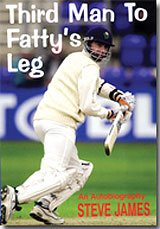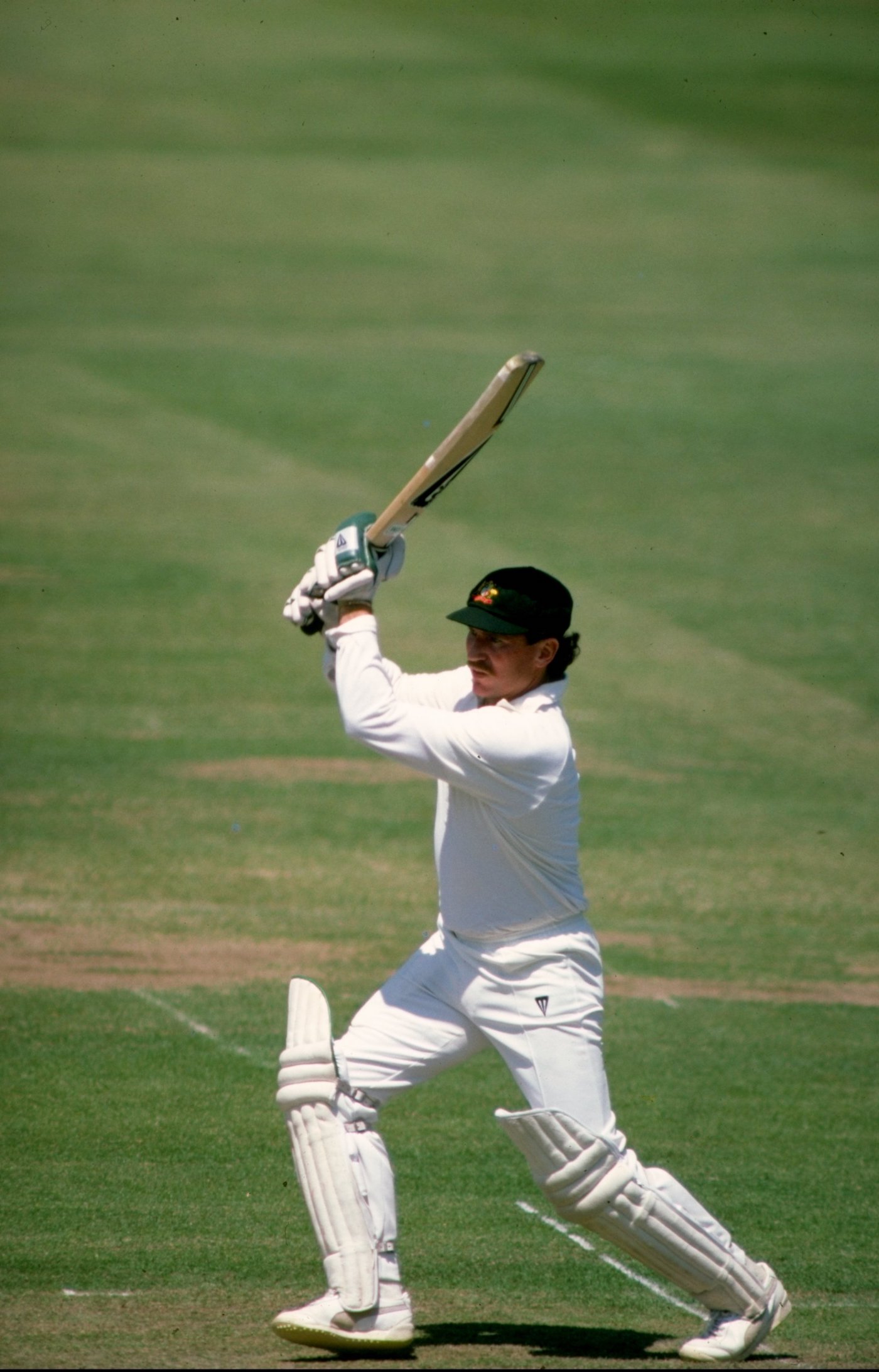Thursday, July 28
|
|

|
Have been reading Third Man to Fatty's Leg, the thoughtful, free-ranging autobiographical reflections of Steve James, an opening batsman twice capped by England who did yeoman service for Glamorgan. Its tone alternates between light-hearted anecdote and brooding, almost sorrowful self-deprecation. James quotes back every slight he ever experienced with a kind of nodding approval. He recalls, for instance, being sledged while representing Cambridge by Phil Tufnell: "I can't wait to play Glamorgan this year. They must be crap if you can get a game for them." Robin Smith confided in one of James' county team-mates in 1994: "Jeez he's an ugly batsman, that James." Says James: "He was right. Around that time I was awful."
The confession struck me forcibly. I actually saw James bat in person only once, at Fenner's, in the early 1990s. The 30-odd he scored in a distinctly ordinary side contained several shots of a unusual fluency and timing. Perhaps it was the mediocrity of the company, but I thought he would make something of himself. In fact, I harboured precisely the thought: "He will play for England." Yet by his own reckoning, it would seem, this could not have been further from James' mind, and my opinion at the time had almost no aesthetic or statistical basis. I was in the end, moreover, barely right: he played his two Tests only as a last-minute inclusion. But I was. This is not to claim any particular intuition or prescience.
I well remember my first impression of Brett Lee after watching him bowl some awful rubbish for New South Wales against Queensland in 1999. "What's all the fuss about?" I thought. "He bowls two bouncers and four half-volleys every over." Good batsmen would take him apart, I imagined, as one had that day in Martin Love, compiler of an attractive double-century. But first impressions matter, and to those runs and wickets we see ourselves, we tend to attach disproportionate weight. And in extreme cases, as little as a single stroke can seem to hold forth the promise of some differentiating quality. Duncan Fletcher apparently sensed Michael Vaughan's promise merely from the way he shaped: the first two Vaughan innings that Fletcher saw produced two runs. James' reflections exemplify, too, how different is the cricket world at close quarters, on the pitch and in the mind, to that experienced by the fantasising spectator, and how the mind games played by oppositions are nothing to those we play with ourselves.
Wednesday, July 27
|
|

|
Allan Border's birthday; Jack Iverson's too. Allan is 50; Jack would have been 90. Both cricketers about whom I have written books, and perhaps as convincing an argument as I know of against astrological determinism. AB was a born survivor, Wrong Grip Jake a casualty in the making.
There's something a little disconcerting about the fact that the date touches off such a ready response in me. I'm inclined to penetrate to the cricket layer in everything. Dates, for instance, come to be defined by their cricket relations. A couple of days ago, my friend Stephen Fay told me he was reviewing a book about Venice in 1848. "The year of the Communist Manifesto," I said, "and of W. G. Grace's birth." At least I knew the former, but I'm damned if I can work out why I know the latter, or indeed quite where it gets me.
I also have a strange propensity for detecting otherwise unsuspected cricket content. Yesterday, in an attempt to avoid Ashes thoughts entirely, I went browsing in a secondhand bookshop on Charing Cross Road, looking particularly for some additions to my collection of company histories. My eye was caught by the 1931 volume published on the centenary of the confectionery dynasty Cadbury. When I flicked it open at random, I learned that the first thing that company patriarch George Cadbury read in the newspapers every day were the cricket scores. I hardly dared touch anything else, lest I learn that Lord Leverhulme bowled left-arm googlies, or that the Rothschilds cornered the market in cricket ball leather.
Tuesday, July 26
One of the great traditions of English defeat used to be `naughty boy nets': the penance served by players on the days they had been scheduled to play the Test they'd just lost by several thousand runs, even as the tabloids crafted their faces into turnips. Remember the grand old days when there would be pictures in the papers of the grim-set features of Micky Stewart or Keith Fletcher supervising the players serving their detentions? It seems to have fallen into disuse; nowadays the players don't even play. While Australia heads to Worcester for a game they barely need, the English players disperse and are either rested or given a run-around in one-day cricket. Freddie Flintoff's preparation for Edgbaston will be playing in the Twenty20 finals on Saturday, while Michael Vaughan is slated for one-on-one sessions with Duncan Fletcher ahead of a totesport League game on Sunday.
This is in keeping with what Vaughan says in his diary of last year: `If I have a bad day or hit a bad shot, I'll think about what has happened, analyse everything and then work on eradicating the flaw or problem. Once I wake up the following morning I am ready to move onto the next issue.' Easy really. Mind you, one wonders why he hasn't done this already when his form for the last six months has been so erratic. An illuminating piece in the Guardian today by my colleague Alex Brown describes Warne's pre-match practice ritual with Terry Jenner. Since they were introduced fifteen years ago by Rod Marsh, Jenner has come to know Warne's technique in intimate detail. His arrival also has a talismanic quality for Warne, who associates him with the feeling of being on top of his game. With England, by contrast, games seem not so much built as constantly under repair. At least one local tradition is intact: that of locking the stable door after the horse has bolted.
Monday, July 25
A day at my digs in Islington writing, and also reading some very good words, including Simon Barnes in The Times: `Kevin Pietersen's cheerful six-hitting at the end was like the V-sign you give the headmaster ten minutes after you've left school. It makes you feel a bit better, but it doesn't affect the balance of power'. And it's still the case that nobody crafts a more waspish metaphor than Martin Johnson in the Daily Telegraph: `He [Geraint Jones] has a pair of wicketkeeping gloves that appear to have been hewn from a trampoline, and his attempt to catch Jason Gillespie by sticking out an arm was less like watching a professional athlete as one of those old Morris Minors with a semaphore trafficator.' Say what you like about England's cricketers, they are superb sport for columnists.
Gideon Haigh is a cricket historian and writer, who is covering the Ashes tour for the Guardian. His diary will appear on Cricinfo every day
